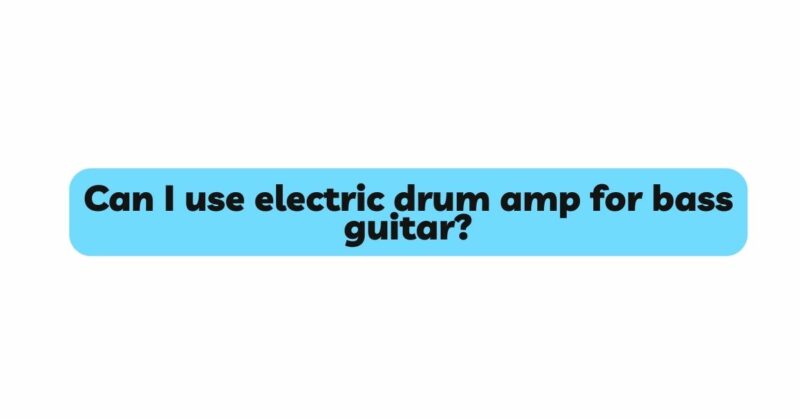Music is a boundless realm of creativity, where artists continuously explore new horizons to innovate and shape their sonic landscapes. One intriguing question that arises is: Can you use an electric drum amp for a bass guitar? This article embarks on a journey to uncover the possibilities, challenges, and potential creative avenues that arise when considering an electric drum amp as an amplification solution for the resonant tones of a bass guitar.
Understanding Electric Drum Amps and Bass Guitars
Before diving into the concept of using an electric drum amp for a bass guitar, it’s essential to grasp the essence of each instrument and amplifier.
Electric Drum Amps: Electric drum amps, also known as electronic drum monitors, are meticulously crafted to amplify the diverse array of sounds produced by electronic drum kits. These amplifiers prioritize clarity, definition, and accuracy to deliver an immersive experience for drummers during practice and performance. They provide a canvas for the intricate nuances of electronic drum sounds.
Bass Guitars: Bass guitars, on the other hand, are responsible for generating the foundation of rhythm and harmony in music. They produce deep, resonant low-frequency tones that require precise amplification to maintain their power and tonal qualities. Bass amps are engineered to reproduce and enhance these low-end frequencies, providing a solid foundation in any musical ensemble.
Exploring the Viability of Electric Drum Amps for Bass Guitars
The notion of using an electric drum amp for a bass guitar might seem unconventional, yet it presents an avenue for musical exploration. Technically, it is possible to connect a bass guitar to an electric drum amp, but this approach comes with several considerations and potential challenges.
Frequency Response and Tonal Characteristics
One of the central considerations when using an electric drum amp for a bass guitar is the difference in frequency response and tonal characteristics.
Electric Drum Amps: Electric drum amps emphasize a broad frequency spectrum to accurately reproduce the various electronic drum sounds, from cymbals to percussion elements. While they can project low-frequency tones, they might not provide the same depth, warmth, and power that a dedicated bass amp delivers.
Bass Guitars: Bass guitars generate deep, resonant low-frequency tones that form the backbone of a musical composition. Bass amps are engineered to accentuate these frequencies, often equipped with larger speaker drivers and tailored circuitry to reproduce the instrument’s tonal intricacies. This results in a rich, punchy sound that complements the musical arrangement.
Sound Projection and Amplifier Design
Another critical aspect to consider is sound projection and amplifier design when employing an electric drum amp for a bass guitar.
Electric Drum Amps: Electric drum amps are designed to provide accurate sound representation for drummers in close proximity. They are optimized for near-field sound projection rather than projecting over larger distances, potentially limiting their effectiveness in amplifying the low-end frequencies of a bass guitar across a stage or venue.
Bass Guitars: Bass amps are engineered for powerful sound projection, ensuring that the low-frequency tones are audible even in larger spaces. They often feature higher wattage and larger speaker cabinets to disperse the bass frequencies effectively, resulting in a resonant and impactful sound that resonates throughout the venue.
Equalization and Tone Shaping
Equalization and tone shaping are critical aspects of optimizing the compatibility between electric drum amps and bass guitars.
Electric Drum Amps: Electric drum amps offer equalization controls to refine the mid-range frequencies, enhancing the articulation and definition of drum sounds. These controls might need adjustments to accommodate the broader tonal spectrum of a bass guitar.
Bass Guitars: Bass amps provide an extensive equalization spectrum, allowing bassists to tailor their desired tonal profile. When connecting a bass guitar to an electric drum amp, precise equalization adjustments are necessary to ensure that the bass tones remain robust and resonant without sacrificing clarity.
Creative Exploration and Limitations
Despite the potential challenges, using an electric drum amp for a bass guitar can offer creative exploration and unique sonic outcomes. Musicians with a penchant for experimentation and an open mindset can harness the tonal characteristics of a drum amp to introduce distinct colors to their bass guitar sound.
However, it’s crucial to acknowledge the limitations. The electric drum amp may not fully capture the depth and resonance of bass guitar frequencies, potentially leading to a lack of impact and clarity. Moreover, sound projection might be compromised in scenarios requiring powerful and punchy bass tones.
Conclusion
In conclusion, the utilization of an electric drum amp for a bass guitar is an avenue for creative experimentation that necessitates careful consideration of compatibility and sonic expectations. While technically feasible, the differences in frequency response, sound projection, and tonal characteristics between instruments and amplifiers must be navigated.
Musicians treading this innovative path should approach it with an open mind, embracing the potential for unique sound textures and creative combinations. While an electric drum amp may not replace a dedicated bass amplifier in all scenarios, it contributes a layer of versatility and innovation to the ever-evolving world of music amplification. As artists continue to push boundaries, the exploration of unconventional amplification methods enriches the tapestry of musical expression.


